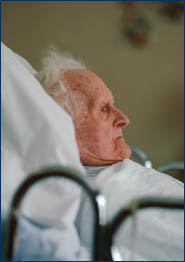|
|
Many
Elderly Going to Bed Hungry:
Study Finds Some Aid Not Getting to South Shore
By
Sue Scheible, The Patriot Ledger
January
11, 2006

Isolated and unable to get to the store or cook for themselves, elderly people in Southeastern Massachusetts are going to bed hungry and missing out on government programs like food stamps that can help them.
That is the portrayal in a report from the South Shore Community Action Council that its executive director calls ''powerful and disturbing'' and a call to action.
''I was shocked as a Massachusetts resident to see we are so far behind in serving eligible seniors with food stamps,'' said Patricia A. Daley, executive director of the nonprofit agency.
Only 6.5 percent of 300 low-income elders surveyed last year had received federal food stamps in the previous month. Nearly all would be eligible; more than 41 percent said they would be interested to get them this year.
''With rising housing and energy costs, people on fixed incomes turn to their food money as the only flexible money they have for those other bills,'' Daley said. ''I can feel the pressure from all over to do more.''
The 28-page ''Elderly Nutrition Needs Assessment'' surveyed low-income elders, ages 66 to 100, in 10 towns from Marshfield and Pembroke to Plymouth and Wareham. The average age was 79; all were receiving federal fuel assistance. Three-fourths live alone and eat alone, most in their own houses.
Thirty-three Greater Plymouth agencies that offer nutrition or meals services were also surveyed. Councils on aging, food pantries, low-income housing and multi-service centers participated.
The report describes ''a troubling picture of widespread food insecurity and nutritional risk.''
Among the findings:
-One in seven elders went to bed feeling hungry sometimes or often.
-One in four had had to choose between paying for food and paying for utilities or heating fuel.
-More than half were judged at high nutritional risk.
-A third were not always physically able to shop, cook or feed themselves.
The three biggest gaps in existing services were:
-Elders who live alone in their own houses lack transportation to food stores and hot lunch programs.
-Elders lack information about available nutritional services and food programs.
-The agencies lack enough funding or other resources to boost their programs while demand grows.
Many of the councils on aging and senior centers rely on volunteers to deliver hot meals to shut-ins and to help at the noontime lunch programs at the centers. There is a continual call out for more volunteers and at some agencies, staff deliver the meals.
Mary Willis, director of the Pembroke Council on Aging, recently visited a woman in her 80s who lives alone and is losing her vision. The woman receives $675 a month from MassHealth (Medicaid) and SSI (Supplemental Security Income) and received food stamps in the mail.
''She said, 'Oh, I got these in the mail, so I guess I'll use them,''' Willis said, ''but if she hadn't automatically received them, she wouldn't have asked for them.''
The woman declined a request for an interview.
''The elders who go hungry are very embarrassed - they don't want others to know they have been reduced to that level,'' Willis said. ''They are very proud old Yankees.''
The Pembroke senior center delivers 30 to 40 hot lunches a day and serves a nutritious lunch to 25 to 30 other seniors who come to the center. Some of the seniors say they would like more food, larger portions, because the meal there is the one decent meal they get a day. Otherwise, they open a can of soup or have a sandwich.
The senior center asks for a $2 donation for the hot lunch, provided through Old Colony Elderly Services in Brockton. For some seniors who cannot afford that, there is a scholarship fund.
The 10 towns in the survey were Carver, Duxbury, Halifax, Hanson, Kingston, Marshfield, Pembroke, Plymouth, Plympton and Wareham.
As a result of the report, a public forum on elderly nutrition will be held from 10 a.m. to 12:30 p.m. April 4 at the Plymouth public library.
The forum will share ideas on how to improve services.
Services seniors would like to use
41 percent would like to have food stamps
18 percent want more information about nutrition
16 percent want food pantry groceries
8 percent want meals delivered to their homes
8 percent would eat at a senior center or adult day care
|
|



